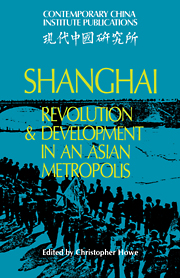Book contents
- Frontmatter
- Contents
- List of illustrations
- Preface
- Foreword
- Abbreviations
- PART ONE THE MODERN HISTORICAL PERSPECTIVE
- PART TWO POLITICAL LIFE
- 2 Political mobilization in Shanghai, 1949–1951
- 3 Shanghai and Chinese politics: before and after the Cultural Revolution
- 4 Shanghai dockers in the Cultural Revolution: the interplay of political and economic issues
- 5 The Shanghai Connection: Shanghai's role in national politics during the 1970s
- PART THREE ECONOMIC DEVELOPMENT AND LIVING-STANDARDS
- PART FOUR THE SUBURBAN TRANSFORMATION
- PART FIVE CULTURE AND IDEOLOGY
- Notes
- A chronology of modern Shanghai, 1842–1979
- Contributors
- Index
3 - Shanghai and Chinese politics: before and after the Cultural Revolution
Published online by Cambridge University Press: 14 October 2009
- Frontmatter
- Contents
- List of illustrations
- Preface
- Foreword
- Abbreviations
- PART ONE THE MODERN HISTORICAL PERSPECTIVE
- PART TWO POLITICAL LIFE
- 2 Political mobilization in Shanghai, 1949–1951
- 3 Shanghai and Chinese politics: before and after the Cultural Revolution
- 4 Shanghai dockers in the Cultural Revolution: the interplay of political and economic issues
- 5 The Shanghai Connection: Shanghai's role in national politics during the 1970s
- PART THREE ECONOMIC DEVELOPMENT AND LIVING-STANDARDS
- PART FOUR THE SUBURBAN TRANSFORMATION
- PART FIVE CULTURE AND IDEOLOGY
- Notes
- A chronology of modern Shanghai, 1842–1979
- Contributors
- Index
Summary
Shanghai is one of China's twenty-nine provincial-level units: an object of central control that should support and implement policy decided by the national authorities. Compared with other local units, however, what distinguishes Shanghai is the degree to which it has been a source of influence over the Chinese political scene since the 1960s. It was the base from which Chairman Mao Tse-tung launched the Great Proletarian Cultural Revolution (GPCR) in 1965 and a vanguard in Mao's crusade thereafter. In 1967 Shanghai came under the control of Radical leaders, and this ‘Shanghai group’ turned it into the stronghold of China's radical political forces and used it to contend for national power. For almost a decade during 1967–76, Shanghai's inputs into national policy, leadership personnel, and elite conflict were considerable and unprecedented.
What are the factors that account for Shanghai's political prominence? Why did Mao choose it as a base to launch the GPCR? How was the ‘Shanghai group’ formed? Through what channels and using what resources did Shanghai (more precisely, the Shanghai leadership) influence national policy and shape Chinese politics? This essay attempts to analyse these and other questions relating to the role of Shanghai in Chinese politics since the mid-1960s.
THE BUILD-UP TO THE CULTURAL REVOLUTION
On 10 November 1965, the Cultural Daily of Shanghai published an article entitled, ‘On the New Historical Play “Hai Jui Dismissed from Office”’ under the byline of its editor, Yao Wen-yuan.
- Type
- Chapter
- Information
- ShanghaiRevolution and Development in an Asian Metropolis, pp. 66 - 90Publisher: Cambridge University PressPrint publication year: 1981

